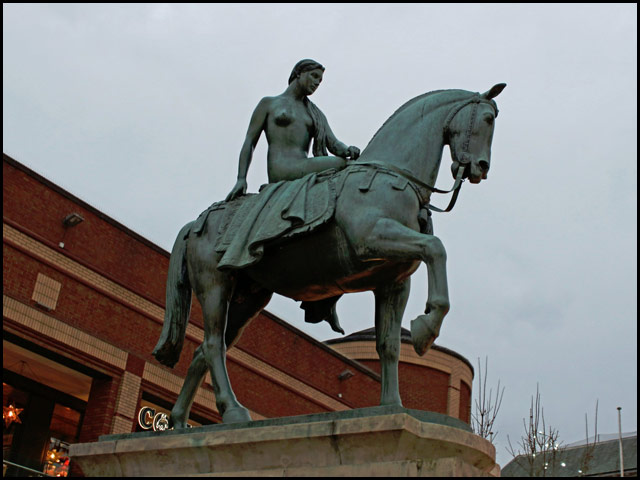(Originally posted on LiveJournal)
I’ve been planning for a long time to do my own version of the Lady Godiva legend. About five years or so, at least. I’d originally planned to make it a screenplay. But since it’s a period piece, I eventually decided it would be better to write it as a novel first. I’ve done lots of the research, I know when I’m going to set it, what the context is.
 So, today, I sat down to rearrange my notes and do the preliminary work to prepare to start writing it. Because I needed to recheck some details, I was doing some online searching. In the course of that, I ran across something that gave me a little pause.
So, today, I sat down to rearrange my notes and do the preliminary work to prepare to start writing it. Because I needed to recheck some details, I was doing some online searching. In the course of that, I ran across something that gave me a little pause.
Recently, a novel by Nerys Jones was published: Godiva. Yeah. Right. What fun. Beaten to the draw?
I checked out a review of the book, and was greatly relieved by what I found. Jones’ book is totally different from what mine will be. First off, Jones chose a different time period for her version of the story. In a totally different political situation. That made me smile a lot, because I really, really like the choices I made for my story. And it looks like we’ve made different choices regarding Godiva’s character and relationships. All well and good. I can continue on with my project without worrying about the appearance of copying, plagerism or any other such infraction.
But it did get me thinking about the matter of synchronicity. Because I’ve seen it happen in various ways. In Hollywood, there was the infamous overlap of volcano projects (Volcano and Dante’s Peak). It’s one of those things that does incline me to believe there might be something to the term “collective unconscious”. Some ideas just seem to vibrate in the ether for a period and multiple people pick up on it.
Now, I think that when it comes to stories, it doesn’t really matter too much, because each writer is unique and each will put his or her own stamp on the story being told. I wasn’t quite so confident when I was in junior high, though. At that time, my ambition was to become a fashion designer, and I used to doodle designs during any spare moment. What would freak me out was that a few months after I’d doodled something, I’d start seeing it show up in fashions. I couldn’t figure out whether it was seeing into the future, picking up on “something in the air”, or me just being unique ahead of the wave. But it got to the point where it bugged me so much that I started feeling maybe I shouldn’t go into that career. (That decision got sealed when I did a civics class project on the career — too much art school, and too much doing illustrations of other people’s designs would have been involved.)
So, after today’s experience, I wondered if other writers have run into this type of sychronicity which seems to echo something you’ve been working on yourself. Has it? What’s your reaction to it?
Comments
dannydonovan – Apr. 19th, 2008
Well there really only *so* many stories in the world, the differnce is in the telling. However, the bandwagon thing happens purely out of greed. The Volcano thing, as well as the Asteroid thing (the Ben Affleck movie vs. the Tea Leoni movie) most people sell their concepts and they sit in that bin of stuff “we have just to have” and then someone greenlights one type of film, it looks like (and gets buzz by certain moneymen pundits) it’ll do well, so other studios go through their pile to see what they have the rights to that follows the same meme so they can cash in on the new trend.
Same with books and comics. When Steve Niles made horror cool again with 30 Days Later, everyone started digging up all their old horror properties, and greenlighting years old pitches to catch up on the bandwagon.
Good way of getting in on the ground floor, and making some money cashing in when the market so desperately wants something in that flavor. And it’s easier to sell a new concept having other things that follow the same idea that’ve made money.
Everyone wants to cash in on trends while they’re hot.
good luck!
scribblerworks – Apr. 20th, 2008
There is that, of course, the “jump on the bandwagon” thing. Which makes me wonder why we haven’t had lots and lots of pirate pictures sailing into our theaters. Heh.
dannydonovan – Apr. 20th, 2008
Because they realize it was never about the “pirates” it was about the ‘world’ created. It was a lightning in the bottle thing. Depp is the only person to make it work.
For every POTC there’s a “Cutthroat Island” There were a lot of attempts to cash in on a cross-product thing, WWE had a wrestler modeled after Depp, who really did resonate with the fans just due to how good the Sparrow impression was, but when it was more of a generic pirate thing, didn’t work so well.
Sid Myers Pirates game which was awesome, didn’t really blow people away as well as they thought. They thought it’d be a new “Civilization” but while the mechanics were there, the execution was lacking.
(while they’re different genres they tap into the same public conciousness and compete for the same discressionary income funds, so it’s important to see where the cultural pop culture trends are going and see how best to try to capitalize them in your own industry)
So studios saw a trend that was almost unique to a certain IP and wasn’t translatable to other properties. So they moved onto the next meme, which was going back to the well and updating things from the 70s and 80s.
sartorias – Apr. 19th, 2008
Oh yeah. And I’ve been screwed by it many times. “Hey, how about crossing the Regency with magic?” “No, you can’t mix genres.” “But I have a great idea…” “No, don’t waste your time.”
The Zeitgeist seems to lend itself to developing similar patterns in a lot of us.
scribblerworks – Apr. 20th, 2008
But mixing genres seems to be so much the thing now, doesn’t it.
How about “Regency and vampires”? “Regency and pirates?” Or even way out on the limb, “Regency and aliens”?
Heh. Sorry. I suppose the real trick is to make Zeitgeist trends work for oneself.
sartorias – Apr. 20th, 2008
Now it’s pretty much de rigueur, but when I first proposed it twenty years ago, it wasn’t…but. Then Wrede and Stevermer published Sorcery and Cecelia.
So yes, one has to be in the right place at the right time with the right person and the right project to make it work!
wild_patience – Apr. 20th, 2008
I’m not a writer, but as a reader, I’ve certainly noticed this. I can love it or hate it, depending on what it is. I was in agony one year on the MFA committee because there were several books, well-written and important, mind you, but very difficult for me to read because of the child abuse in them. I was so glad when the child abuse thing blew over. (The books I’m thinking of were Robin McKinley’s Deerskin and Susan Palwick’s first novel, Flying in Place. There was also a short story anthology, The Armless Maiden and maybe a few others. It was just too much intensity in too short a period.)
scribblerworks – Apr. 20th, 2008
Yikes, yes! That is one “trend” that would have been better to have been less concentrated.
muuranker – Apr. 20th, 2008
A different synchroncity.
This morning I woke up in … Coventry!!!
So not ‘another author has written my story’ synchronicity, but a a synchronicity all the same.
The Tolkien Society AGM was there on Saturday. Consider yourself among the ‘absent friends’ toasted.
I don’t know what time period you are considering, so I don’t know how useful it would be for you to look at the photographs of Coventry before the bombing (it was rather like Stratford upon Avon or Warwick.
I’d like to read a Godiva story set in the 1950s.
It was strange, seeing Coventry for the first time only months after seeing Nagasaki for the first time.
Maybe the synchronisity comes out of the themes of the story?
scribblerworks – Apr. 20th, 2008
Re: A different synchroncity
Well, “different period” is sort of flexible, since I am still setting it in Anglo-Saxon England. But Jones sets the tale during the reign of Edward the Confessor (in the late 1040s, I believe), whereas I’m setting it in 1041, during the reign of Hardecanute.
The legend doesn’t really specify period, although during the reign of Edward Longshanks it was estimated to be about 200 years old then. But when I began my research, I looked at what was known of the economy during that general period.
As it happens, 1041 is a good year to choose. For two years prior to that there had been terrible weather in England, causing a general shortage of supplies and bad crops and harvests.
And also, because the motivation was dealing with taxes, I looked for a period where there might be some unusual tax conditions. When Hardecanute arrived in June 1040, he was a bit ticked off at the English. He was 23, and was supposed to be his father’s (Canute the Great) heir. But the English lords had chosen his bastard elder brother Harald as king 5 years before (Harald was only 2 years older, by the way). Hardecanute arrived with 62 boats of retainers (soldiers all). At 50 (or 40) men per boat (usual number of rowers for a war boat), this was a HUGE amount. And Hardecanute demanded 8 marks per man from the English to pay for his retainers.
A mark was approximately 1 English pound, which was 240 silver pennies. A silver penny was one day’s wage. So basically, he was asking for 1 year’s wage from 8 men per one of his soldiers. On the heels of the two worst years England had seen economically in a long time.
And the tax had to be paid in coin only. They would not accept “kind” (ie, goods). When there was probably not that much coin in the realm at all.
On top of that, the people of Worcester revolted at the tax. Hardecanute sent 2 of his close friends to collect the tax, and the citizens of the city killed them, skinned them, and tacked the skins to the cathedral door. Hardecanute’s troops marched into Worcester, killed many and burned the town (this was early in 1041).
Now, Worcester fell within the boundaries of Mercia at the time. Earl Leofric (which I’ll be spelling “Leofrich” for the sake of pronounciation) was Earl of Mercia. His actual seat was in Chester, so I had to figure out why Coventry was so important. I decided that since Coventry lies about 2 days march from the probable boundary of Welsh territory, he would use it as a staging area to fend off expected raiding/invasion by the Welsh (who had also suffered from the last two years of bad weather and harvests). Plus it put him near the trouble area of Worcester, because as their lord, he’d be responsible for paying the weregild on the two men killed – which Hardecanute was demanding on top the tribute for his soldiers.
All these factors led me to conclude that 1041 was the ideal year for Godiva’s plea about easing taxes.
On top of all that, and where the idea to tell the story at all begain… the tail end of the entry in the Encyclopedia Britannica about Godiva mentions that in 1047 (I think, don’t have the notes at hand), Godiva and Leofric founded the monestary in Coventry that became the linchpin of that local economy. I wondered… “How does a married pair get from the situation described in the legend, where she is basically publically shamed, to the working partnership that founding seemed to indicate?”
And that is how I got into the story.


